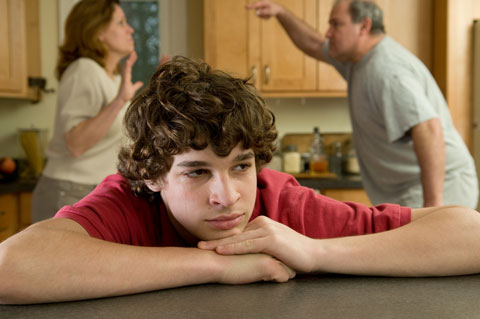-
The self-inflicted wounds of the family and the need to put aside anger and friction to protect the couple’s children were at the heart of Pope Francis’ message to thousands of pilgrims gathered for the weekly General Audience on Wednesday.Speaking under overcast skies in St. Peter’s Square, Pope Francis reflected on the Gospel reading from Matthew (Mt 18,6) in which Jesus says to his disciples, “unless you turn and become like children, you will not enter the kingdom of heaven.” And, Christ’s grave warning: “Whoever causes one of these little ones who believe in me to sin, it would be better for him to have a great millstone hung around his neck and to be drowned in the depths of the sea.”A family’s wounds and end of conjugal love a “landslide” burying childrenNo family is immune to words and actions – or lack there-of – which “diminish or even worse, mortify love,” the Pope said. “When these wounds, which can still be remedied, are neglected, they become worse: they turn into arrogance , hostility, contempt.” They can then fester into deep lacerations, the Pope continued, that divide husband and wife who may “look elsewhere for understanding.”The “emptying” of conjugal love, the Pope said, spreads resentment in relationships and the falling apart of the family is like a “landslide” which buries the children.Are we “anesthetized” to the psychological trauma children suffer?The Pope asked if we who have an “apparently evolved sensitivity” and access to the most “refined psychological analysis” have not become “anesthetized” to the psychological trauma that children suffer.Giving them gifts and snacks just desensitizes one to the deep pain that children suffer, the Pope noted. “We speak often of behavioral disorders, psychological health , the wellbeing of the child, of the anxiety of parents and children… But do we know yet what is a wounded spirit?“We feel the weight of the mountain which crushes the spirit of a child” in families in which people hurt each other “to the point of breaking conjugal fidelity,” said the Pope.“When the adults lose their head, when everyone thinks about him/herself, when the father and mother hurt each other,” Pope Francis observed, it is the children who suffer the most.When the family is injured in one part, the whole is infectedEverything is tied together in the family, he said, and when it is injured in one part, the whole becomes infected. Observing that married couples are called to be “one body” in marriage and the rearing of children, the Pope said that obsessive attachment to one’s own freedom and gratification is a “distortion” that deeply affects children.Recalling Christ’s admonition in Matthew not to “scandalize” the little ones, the Pope said we can better understand the “grave responsibility of caring for the conjugal bond.”Separation can be “inevitable” or “morally necessary”However, the Pope admitted “there are cases in which separation is inevitable. Sometimes it can become even morally necessary, precisely when it comes to subtracting the weaker spouse, or small children, from more serious injuries caused by arrogance and violence, by humiliation and exploitation, by extraneousness (non-involvement) and by indifference.”“There are, thank God, those who, sustained by faith and love for their children,” the Pope continued, “give witness to their loyalty to a relationship in which they believed, even though it appears impossible to revive it. Not all separated [couples], however, feel this vocation . Not everyone recognizes, in solitude, the Lord’s call to them.”Families living “irregular” situationsSome families today live in so-called “irregular” situations, the Pope observed, saying that he does not like that word, and that we must reflect on how to help and accompany them – and accompany them so that the children do not become “hostages of the father or the mother.”Below please find the English summary of the Pope’s remarks read out to pilgrims attending the General Audience:Dear Brothers and Sisters: We know well that every family on occasion suffers moments when one family member offends another. Through our words, actions, or omissions, instead of expressing love for our spouse or children, we can sometimes diminish or demean that love. Hiding these hurts only deepens such wounds, leading to anger and friction between loved ones. If these wounds are particularly deep, they can even lead a spouse to search for understanding elsewhere, to the detriment of the family, especially children. Being one flesh, any wounds that spouses suffer are shared by their children, born of their flesh. When we remember how Jesus warned adults not to scandalize little ones (cf. Mt 18:6), we better understand the vital responsibility to maintain and protect the bond of marriage which is the foundation of the human family. We thank God that although these wounds may lead some to separation, even then many men and women remain true to their conjugal bond, sustained by faith and by love for their children. For those who enter into so-called irregular situations, we must reflect on how best to help and accompany them in their lives. Let us ask the Lord for a strong faith to see with his eyes the reality of family life, and for a deep love to approach all families with his merciful heart.I offer an affectionate greeting to all the English-speaking pilgrims and visitors present at today’s Audience, including those from England, Scotland, Wales, Ireland, Sweden, Australia, Indonesia, Japan, the Philippines, Vietnam, the Islands of the Bahamas, Canada and the United States. May Jesus Christ heal every wound present in the life of your families, and may he make you witnesses of his mercy and love. May God bless you all!
Source: Vatican Radio





